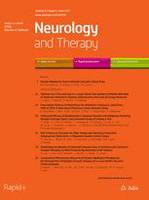
Acta Epileptologica
Scope & Guideline
Unveiling the latest trends in epilepsy treatment.
Introduction
Aims and Scopes
- Mechanisms of Epilepsy:
Research focused on understanding the biological, genetic, and molecular mechanisms underlying various forms of epilepsy, including biomolecular pathways, genetic mutations, and neurophysiological changes. - Clinical Management and Treatment:
Studies investigating the efficacy and safety of different therapeutic interventions, including pharmacological treatments, dietary therapies, and surgical options for managing epilepsy. - Patient-Centric Research:
Research emphasizing the quality of life, psychological impact, and social aspects of living with epilepsy, including stigma, comorbidities, and health-related quality of life. - Diagnostic Innovations:
Exploration of new diagnostic techniques and biomarkers for epilepsy, including advanced imaging methods and electrophysiological assessments. - Epidemiology and Risk Factors:
Studies examining the prevalence, risk factors, and demographic aspects of epilepsy across different populations, with a focus on understanding variations in incidence and access to care.
Trending and Emerging
- Personalized Medicine and Genetic Research:
An increasing emphasis on personalized treatment strategies based on genetic profiles and biomarkers, which is crucial for tailoring interventions for drug-resistant epilepsy. - Neurotechnology and Neuromodulation:
Growing interest in the application of neurotechnological advancements, including neuromodulation techniques such as vagus nerve stimulation and deep brain stimulation, for managing epilepsy. - Dietary and Lifestyle Interventions:
A notable trend towards exploring dietary therapies, particularly ketogenic diets, as alternative treatment options, reflecting a shift towards holistic management approaches. - Impact of Comorbidities on Epilepsy:
Research focusing on the psychological and social comorbidities associated with epilepsy, highlighting the importance of comprehensive care that addresses both neurological and psychosocial aspects. - Advanced Imaging and Biomarkers:
Emerging studies utilizing advanced imaging techniques and identifying biomarkers to better understand epilepsy mechanisms, improve diagnostics, and predict treatment outcomes.
Declining or Waning
- Traditional Pharmacological Approaches:
While pharmacological treatments remain a core focus, there is a noticeable decline in studies centered solely on traditional antiepileptic drugs, possibly due to the emergence of novel therapies and personalized medicine approaches. - Generalized Epilepsies:
Research specifically targeting generalized epilepsies appears to be waning, with more attention shifting towards focal epilepsy and drug-resistant cases, reflecting evolving clinical priorities. - Non-epileptic Seizures:
The focus on psychogenic non-epileptic seizures (PNES) is less prevalent, suggesting a potential decrease in interest or a shift towards integrating these studies within broader epilepsy research.
Similar Journals

EPILEPSY & BEHAVIOR
Transforming knowledge into solutions for epilepsy and behavior.EPILEPSY & BEHAVIOR is a premier journal dedicated to advancing the field of neurology and behavioral neuroscience, published by Academic Press Inc. Elsevier Science. With a focus on the complex interplay between epilepsy and behavioral disorders, this journal serves as a pivotal platform for researchers, clinicians, and educators alike. The journal holds a commendable position with a Q2 ranking in key categories such as Behavioral Neuroscience and Clinical Neurology, highlighting its influence and contributions to the scientific community. Notably, EPILEPSY & BEHAVIOR is indexed in Scopus, ranking in the top percentiles across various related fields, which underscores the quality and relevance of the research it publishes. As it navigates from its inception in 2000 to its ongoing work into 2024, the journal remains committed to disseminating high-quality research and insights that address critical issues in epilepsy and associated behavioral challenges, providing invaluable resources for ongoing education and innovation in the field.

PRACTICAL NEUROLOGY
Elevating Standards in Neurological Care and ResearchPRACTICAL NEUROLOGY, published by the esteemed BMJ PUBLISHING GROUP, is a prominent journal in the fields of neurology and medicine, significantly impacting clinical practice since its inception in 2001. With an ISSN of 1474-7758 and an e-ISSN of 1474-7766, this UK-based journal reaches a diverse audience of researchers, clinicians, and students who seek to advance their understanding of neurological conditions and patient care strategies. Ranked in the second quartile (Q2) in both the miscellaneous medicine and clinical neurology categories for 2023, and positioned in the 47th percentile among its peers, PRACTICAL NEUROLOGY provides a platform for high-quality research that bridges the gap between laboratory findings and clinical applications. The journal's commitment to disseminating valuable information through peer-reviewed articles ensures that readers are equipped with the latest insights and practical knowledge necessary for improving outcomes in neurology. While access options are not currently open, the journal remains a vital resource for professionals striving to stay at the forefront of neurological research and clinical practice.

Neurology Research International
Shaping the Future of Clinical NeurologyNeurology Research International, published by HINDAWI LTD, is an esteemed open access journal that has been serving the neurology community since 2010. With its ISSN 2090-1852 and E-ISSN 2090-1860, this journal aims to foster knowledge dissemination and facilitate dialogue surrounding key issues in neurology and clinical neuroscience, making it a vital resource for researchers, clinicians, and students alike. It operates from the United States, with its administrative hub located in London, England. As of 2023, the journal has been positioned in the Q3 category for both neurology and clinical neurology, reflecting its commitment to advancing research within these critical fields. With a current Scopus rank of #216/400 in clinical neurology and a #113/192 in neuroscience, and a converged publication timeline from 2010 to 2024, Neurology Research International is dedicated to promoting high-quality research that addresses contemporary challenges and innovations in neurological science. By offering open access since its inception, it ensures that cutting-edge research is freely available, aligning with the global push towards accessible scientific communication.

Clinical Parkinsonism & Related Disorders
Unlocking the mysteries of Parkinson's and related conditions.Clinical Parkinsonism & Related Disorders is a prominent open-access journal published by Elsevier, focused on advancing the understanding and treatment of Parkinson's disease and related neurological conditions. Since its inception in 2019, this journal has aimed to provide a platform for high-quality research, review articles, and clinical studies dedicated to elucidating the complexities of Parkinsonism and its comorbidities. With an E-ISSN of 2590-1125, it has swiftly established its role in the field of clinical neurology, currently ranked in the Q3 quartile for clinical neurology and Q4 for cellular and molecular neuroscience. While its Scopus rankings reflect a competitive landscape, occupying the 241st position in clinical neurology and the 83rd in neuroscience, the journal remains committed to fostering scholarly dialogue and supporting innovative research. Researchers, clinicians, and students will find valuable insights within its pages, contributing to ongoing discourse and the pursuit of effective therapeutic strategies. Access to all articles has been made available since 2019, emphasizing the journal's mission to disseminate knowledge widely and enhance accessibility in the scientific community.

Clinical Epileptology
Empowering knowledge in clinical epilepsy studies.Clinical Epileptology, published by Springer Heidelberg, is an emerging open-access journal that aims to advance the understanding of epilepsy through rigorous research and clinical studies. With an ISSN of 2948-104X and E-ISSN of 2948-1058, this journal serves as a vital platform for researchers, clinicians, and students within the fields of Neurology, Pediatrics, and Perinatology. Although still in its formative years, spanning from 2023 to 2024, the journal aspires to fill the knowledge gaps in epilepsy research, thereby improving patient outcomes. Despite its initial Scopus rankings placing it within the 12th and 19th percentiles in respective categories, Clinical Epileptology is poised to make a significant impact by fostering interdisciplinary collaboration and disseminating high-quality findings. With options for open access, this journal ensures that groundbreaking research is readily available to a global audience, encouraging the ongoing dialogue that is crucial to advancing the field. Intended for a diverse readership, including academic researchers, healthcare professionals, and students, Clinical Epileptology is committed to becoming a cornerstone of epilepsy research.

Current Journal of Neurology
Bridging research and clinical practice in neurology.Current Journal of Neurology, published by Tehran University of Medical Sciences, is an esteemed Open Access journal dedicated to advancing the field of neurology. Since its inception in 2011, the journal has provided a platform for innovative research and critical discourse in neurology and clinical neurology, with a focus on the latest advancements and methodologies. Although the journal currently holds a Q4 quartile ranking in both neurology and clinical neurology, its goal is to foster the global dissemination of knowledge and ideas relevant to the complexities of neurological disorders. Researchers, professionals, and students exploring this dynamic field will find valuable insights, as the journal aims to bridge the gap between emerging research and clinical application. Based in Tehran, Iran, the Current Journal of Neurology welcomes contributions that enhance understanding and treatment of neurological conditions, thereby promoting evidence-based practices across the globe.

Parkinsons Disease
Advancing knowledge in Parkinson's disease and movement disorders.Parkinson's Disease is a prestigious open access journal dedicated to advancing the field of neurology with a special emphasis on Parkinson's disease and related movement disorders. Published by Hindawi Ltd, the journal has established itself as a vital resource since its inception in 2008, transitioning to an open access model in 2010. Featuring the ISSN 2090-8083 and E-ISSN 2042-0080, it has rapidly gained traction in the academic community, currently ranked Q2 in clinical neurology and psychiatry in the 2023 category quartiles, highlighting its significance and quality within the field. With Scopus rankings placing it in the top percentiles for neuroscience and psychiatry, it provides researchers, healthcare professionals, and students with cutting-edge research, reviews, and clinical studies. Situated in London, England, this journal encourages submissions that contribute to the understanding and management of Parkinson's disease, showcasing the latest findings and fostering collaboration among researchers worldwide.

Archives of Neuroscience
Advancing neuroscience through innovative research.Archives of Neuroscience is a multidisciplinary journal dedicated to advancing the field of neuroscience through the publication of original research articles, review papers, and case studies. Published by BRIEFLAND, this journal aims to bridge the gap between neuroscience research and clinical applications, fostering a deeper understanding of brain function, neurological disorders, and potential therapeutic approaches. With an ISSN of 2322-3944 and an E-ISSN of 2322-5769, Archives of Neuroscience serves as an essential platform for researchers, professionals, and students alike, encouraging open access to knowledge and insights that drive innovation in the field. Although coverage was discontinued in Scopus from 2016 to 2017, the journal continues to uphold rigorous standards of academic excellence, making it a valuable resource for the neuroscience community seeking to explore and disseminate new findings. The journal is committed to providing timely access to research tools and findings that are crucial for informed decision-making in both academic and clinical settings.

Neurology and Therapy
Driving Progress in Neurology Through Collaborative ScholarshipNeurology and Therapy, published by SPRINGER LONDON LTD, stands as a pivotal platform for researchers and practitioners in the field of neurology and its therapeutic applications. This Open Access journal, active since 2012, facilitates the dissemination of innovative studies and cutting-edge findings aimed at improving neurological health. With an impressive ranking in the 2023 Scopus Rankings, where it holds a Q2 category in Neurology and a Q1 category in Clinical Neurology, it underscores its prominence in advancing neurological research. The journal's intriguing scope encompasses a wide-ranging exploration of neurological disorders, treatment methodologies, and healthcare strategies, making it a valuable resource for those vested in enhancing patient outcomes. With an appealing average impact factor, readers are encouraged to dive into the latest advancements and engage with the scholarly discussions that are shaping the future of neurology.

Ideggyogyaszati Szemle-Clinical Neuroscience
Elevating Understanding in Clinical NeurologyIdeggyogyaszati Szemle-Clinical Neuroscience, an esteemed publication under the auspices of LITERATURA MEDICA, serves as a pivotal platform in the field of neurology and clinical neuroscience. Established in Hungary, this journal has been committed to advancing the understanding of neurological disorders and treatments since its inception. With its ISSN 0019-1442 and E-ISSN 2498-6208, it provides a unique local perspective alongside valuable contributions to the global discourse in neuroscience. Despite earning a Q4 quartile ranking in both Neurology and Clinical Neurology, the journal remains dedicated to publishing high-quality research that contributes to the scientific community's collective knowledge. Its coverage spans significant converged years from 1954 to 1985 and now continues through 2024, reflecting a rich historical foundation. Recognizing the importance of open access, the journal strives to enhance accessibility, albeit currently lacking a formal open-access model. Researchers, professionals, and students in the field will find in Ideggyogyaszati Szemle a resource vital for keeping abreast of emerging trends and findings in neurological science.